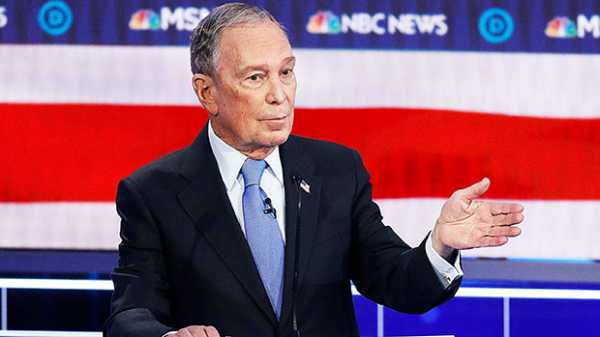
Mike Bloomberg’s gaining ground in the 2020 presidential race, but his first debate was bumpy despite a large, successful ad campaign. Here’s what you should know about the former NYC mayor and his platform.
Former New York City Mayor Michael Bloomberg, 78, entered an already crowded presidential race in November 2019, months after his competitors. His name recognition and $64 billion fortune, which he is using to self-fund his campaign, resulted in instantly earning him a spot as a major contender during the election cycle, despite not qualifying for the Iowa and Nevada caucuses, or New Hampshire primary. While some voters have only been introduced to Bloomberg by seeing Senator Elizabeth Warren call him a “sexist billionaire” at the Las Vegas debate, he has a long history in the political and philanthropic world. Here’s what you should know about the business mogul and former mayor:
1. He served three terms as the mayor of New York City. Bloomberg became the mayor of NYC in 2002 running as a Republican, following the end of Rudy Giuliani‘s two terms. He was re-elected in November 2005, and then in 2008, when he announced that he would seek to extend the city’s term limit laws to run for a third time. He was re-elected in 2009, and left office in 2013, when Bill de Blasio (another 2020 presidential candidate) was elected to succeed him. As mayor, Bloomberg advocated for public education reform and rebuilding the city’s economy and infrastructure after the September 11 terror attacks. However, he also expanded the controversial “stop and frisk” police program. More on that below.
2. He owns a billion dollar corporation that includes Bloomberg News. Before entering politics, Bloomberg was a successful Wall Street investment banker, later running a business that made computer terminals which delivered market news to financial companies. His company expanded into Bloomberg News, Bloomberg Radio, Bloomberg Message, and Bloomberg Tradebook. When entering the 2020 presidential race, he vowed that Bloomberg News wouldn’t cover his campaign with bias.
3. He has been intensely criticized for expanding “stop and frisk” in NYC, a policy that largely targeted people of color. Stop and Frisk was an NYPD practice of temporarily detaining, questioning, and sometimes searching civilians on the street for weapons. Between 2003 and 2013, 100,000 stops were made per year. At the height of the program, in 2011, 685,000 people were stopped by police. Stop and Frisk was criticized as being based on racial profiling, as the vast majority of those stopped (90%) were Black and Latino, mostly between the ages of 14 to 24.
Bloomberg has now apologized for not ending Stop and Frisk once it became clear that most (70%) of those stopped were innocent of any crimes. “I should’ve [apologized] faster and sooner. I regret that and I have apologized — and I have taken responsibility for taking too long to understand the impact it had on Black and Latino communities. This issue and my comments about it do not reflect my commitment to criminal justice reform and racial equity,” he said in a February 11 statement.
4. He has been accused of making misogynistic comments to female employees. Bloomberg is plagued by accusations of alleged sexist behavior reaching back decades, and his company, Bloomberg LP, has been served with at least two lawsuits from women who worked there in the 1990s. Bloomberg has denied making any of the sexist remarks; his campaign chair, Patricia Harris said in a statement to CNN, “In any large organization, there are going to be complaints — but Mike has never tolerated any kind of discrimination or harassment, and he’s created cultures that are all about equality and inclusion. Anyone who works hard and performs well is going to be rewarded, regardless of gender, race, sexual orientation or anything else.”
During the Las Vegas debate, Senator Warren called on Bloomberg to release women from NDAs they signed as part of settlements in harassment lawsuits at the company. “What we need to know is exactly what’s lurking out there,” Warren said. “He has gotten some number of women — dozens, who knows — to sign nondisclosure agreements both for sexual harassment and gender discrimination in the workplace.” Bloomberg has now agreed to release the NDAs.
5. His presidential platforms include raising the federal minimum wage to $15/hour, and “aggressively” combatting the opioid crisis. Bloomberg’s campaign site actually cites 32 issues that he’s working to solve, with innumerable sub-categories. Notably, he wants to forge a better pathway toward citizenship for immigrants, and provide permanent protections for DREAMers. He criticizes Trump’s refusal to recognize climate change, and attempts to repeal the ACA. Unlike Senators Bernie Sanders and Warren, Bloomberg doesn’t want universal healthcare; he wants a “Medicare-like public option.”
Bloomberg also has a comprehensive plan for gun safety: “build a more effective background check system, keep guns out of the wrong hands, tackle daily gun violence in the hardest-hit communities, ban assault weapons, protect kids, and protect schools, hold the gun industry accountable, and take on the NRA.” He pointed out that the number of gun deaths in NYC decreased 48% while he was mayor, and he launched two gun safety groups, Mayors Against Illegal Guns and Everytown for Gun Safety. Additionally, he spent $110 million to elect candidates who supported gun safety in the 2018 midterms.
Whether you’re supporting Bloomberg for president, or another one of the 2020 candidates, it’s important that you VOTE. If you haven’t registered yet, you can do so using the module below.
Sourse: hollywoodlife.com







